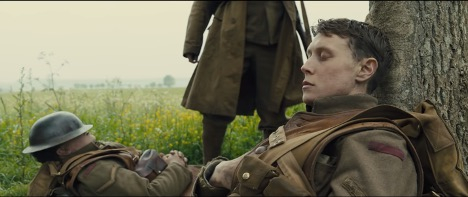1917 Review: Came for the Cinematography, Stayed for the Story

Sam Mendes’ 1917 might be one of the most talked-about films this awards season. It was nominated for 10 Oscars, including Best Picture, Best Director, and Best Cinematography (for which it won), coming only second to Joker in a number of nominations. Regardless of awards, the film has also been widely admired for its ambitious one-shot technique, meaning that there are no cuts between scenes. The film stars George MacKay and Dean-Charles Chapman as our two protagonists, Schofield and Blake, with supporting roles played by Richard Madden, Colin Firth, and Benedict Cumberbatch. The film follows the journey of two corporals in the midst of the First World War delivering a time-sensitive message to a different battalion – be aware, mild spoilers ahead.
While the story of the film has been criticized for feeling surface-level, it at the very least doesn’t pretend to be any more than just that. Even though at times predictable (e.g. the inexperienced young soldier dying at the hands of his own naïveté), we still manage to form a connection between ourselves and our two protagonists. We find ourselves rooting for the lone soldier and his expedition across enemy lines. At the end of the day, the story might have been formulaic, but does that equate to bad? However, with a contender like Parasite, 1917 might have been worthy of the nomination, but not necessarily the award.
Where I feel the film falls short is in its cinematography - hear me out. The film’s one-shot technique is undoubtedly a technical achievement, however sometimes awkward transitions and showy camera movements make the cinematography the star of the show, when it should really be what makes the film beautiful. One-shot camera movements I’ve found to be most effective feel almost effortless, and really make sense with the content of the scene. The six minute tracking shot scene from True Detective comes to mind; the movement of the camera adds to the movement of the characters rather than leading them, like it does in 1917. This isn’t to say that the one-shot technique only lends itself to shorter scenes. Birdman, also uses a one-shot technique, however it differs from 1917 in that the confined space of the setting allows the cinematography to feel effortless. In short, it was almost as if 1917 had bit off a little more than it could chew. While this is where the film falls short for me, the film is definitely still worthy of the win for Best Cinematography, even when up against a competitor like The Lighthouse.
A scene that really struck me was the sequence where Schofield regains consciousness after being hit by a ricocheting bullet. He gets caught in enemy crossfire and I was really taken by the lighting in the entire sequence. It felt almost fantastical but still kept with the realism of the story. It never felt as though it was shot in a studio or with artificial lighting. In this particular sequence, I felt completely absorbed into the film. I would give the film the award for Best Cinematography for this sequence alone.
While the film wholeheartedly deserved its win for Best Cinematography at the Oscars, I don’t think it deserved Best Picture, although it proved to be a worthy contender. The one-shot technique is definitely something that makes the film unique, but also became an obstacle for the audience to feel fully immersed within the story. As for the story, while a bit predictable, it still connected us fully to our protagonists and their mission, so much so that we end up rooting for Schofield at the end of the film. 1917 had a notable goal in wanting to be for World War I what The Thin Red Line was for World War II, or what Full Metal Jacket was for Vietnam. At the end of the day, the film was restricted by such an ambitious cause, and really just became another war movie.







